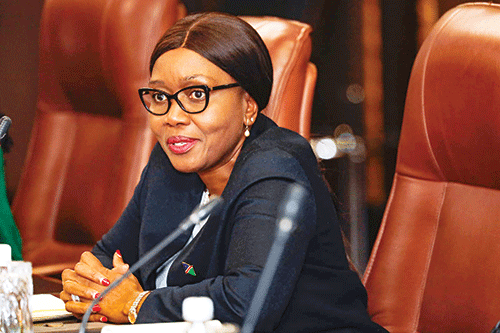Those tasked with crafting the country’s next development plan should adopt innovative approaches, while optimising coordination and cooperation amongst stakeholders.
Prime Minister Saara Kuugongelwa-Amadhila urged that the Sixth National Development Plan (NDP6) should not be business as usual, but must identify game- changers across sectors or ministries.
She made these remarks last week during the launch of the NDP6 formulation process under the theme “Intensify Economic Recovery, Inclusiveness and Resilience
to Ensure Quality and Sustainable Development for all Namibians”.
NDP6 is expected to cover the period of the 2024/25 to 2030/31 financial years.
The timeframe is to allow the implementation of the second Harambee Prosperity Plan (HPPII) programmes and projects to be accelerated, and to extend NDP5 for two years to enable the completion of its programmes and projects.
The head of government said “NDP6 is of great significance in Namibia’s planning journey in that it marks the last medium-term plan to be implemented before Vision 2030. And it is also to be developed after Namibia and the globe
have experienced and continue to experience unprecedented challenges stemming from effects of climate change, the collapse of commodity prices and geopolitical tensions and conflicts”.
The launching of the formulation process is aimed to inform the nation on the developmental journey. The National Planning Commission (NPC) will then embark on wider national consultations to follow soon after the launch.
Kuugongelwa-Amadhila did not shy away at this well-attended event by government officials, and stated that since 2016, Namibia experienced a deterioration in the macroeconomic fundamentals, and economic growth and investment plummeted, public debt rose to unprecedented levels, inflation rates rose, eroding the purchasing power of households’ income, and putting more pressure on already high levels of unemployment as well as exposing the local economy’s vulnerabilities to external
shocks.
“These had negative impacts on poverty and inequalities. In fact, the gains that we have made in terms of reducing poverty were almost completely wiped out. Remember, we reduced poverty from about 38% to about 18%. And now, when you look at the new formula for calculating poverty, close to 50% of the population is living under poverty,” she stated.
Thus, Kuugongelwa-Amadhila directed that NDP6 should be the plan of resolve, determination and courage to overcome and build back better.
She added that the world is changing, and Namibia cannot afford to be left behind in terms of technology. Without tapping into technological advancements, Namibia will suffer loss of employment and uncompetitive products, and relegation in the global value chains.
According to the PM, Namibia needs to transform her economic production units to the lower levels such as villages and households, while local empowerment will be a game-changer in this regard.
Namibia is on course to become a global player in the energy sector, and NDP6 should consolidate these new realities in the form of the acquisition of skills and knowledge and improved governance, employment, industrialisation and wealth-creation that translates into improved welfare conditions for Namibians.
She further urged NDP6 to be a rallying point for all Namibians towards bringing about the Namibia everybody wants, and not just a government plan.
At the same occasion, United Nations’ resident coordinator Hopolang Phororo noted that as NDP6 is the last stretch of the journey to Vision 2030, it needs acceleration in its implementation.
“Hitting targets will require all of us to consolidate human and financial resources, and apply ourselves in terms of determination, focus and commitment. We are convinced that Namibia can do it even in the midst of the negative tailwinds. The future does look promising in terms of new frontiers for accelerating growth, including the renewable energy sector, and leveraging on the benefits of its demographic dividend,” Phororo said.
The coordinator added that NDP6 not only provides a framework for guiding and monitoring progress towards the Sustainable Development Goals (SDGs), but they also play a vital role in enabling policy effectiveness and coordination, promoting international cooperation, raising awareness, and fostering global policy dialogue.
Looking forward, she said the United Nations and the Namibian government recognise that more work still remains to be done with limited resources, and as partners, they will need to find innovative ways of working together.
Going forward
The Harvard Growth Lab at the Centre for International Development (USA) is working to understand the dynamics of economic growth, and to translate those insights into more effective policymaking in developing countries.
Namibia has collected 50 years of information and evidence to understand how countries have successfully and sustainably diversified their economies.
A lot of input to the NDP6 formulation has been preceded by the Harvard Growth Lab project.
Through a virtual presentation, senior manager of applied research from Growth Lab Nikita Taniparti of the Harvard University said going forward, Namibia has a tough job, and growth will need to create employment opportunities which include all Namibians.
“Growth cannot just be driven by the public sector. Growth will also come from a return and an increase in tradeable activities that have multiplier effects, like in mining or in agriculture. Growth will have to come by diversifying into new areas that Namibia has not had a comparative advantage in before, and this involves accumulating the technology and know-how in order to do that,” she added.
Taniparti then advised that a successful diversification strategy would not only identify strategic sectors, but also has to work hand-in-hand with policies to make sure that it is inclusive enough.



